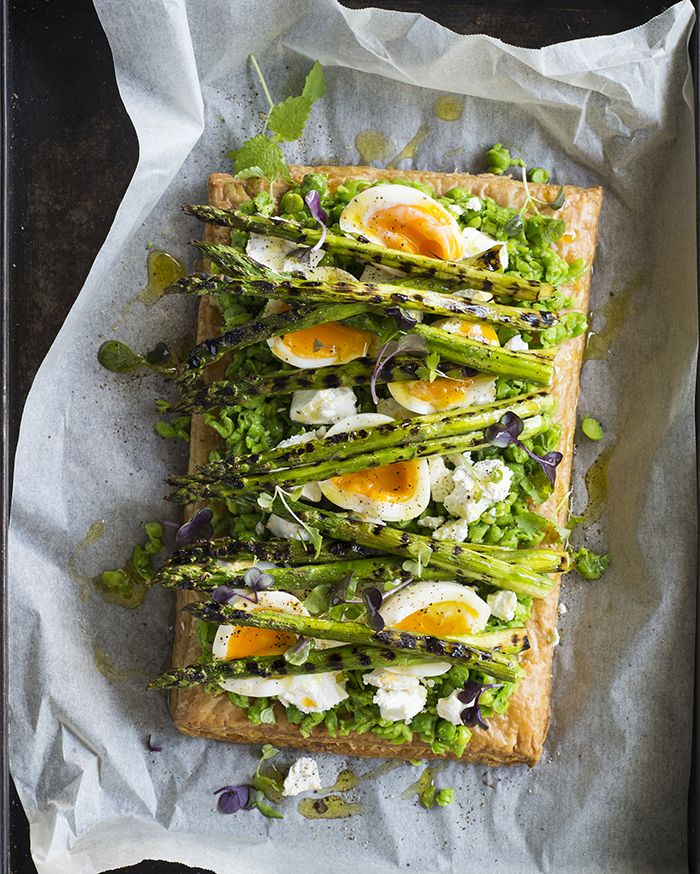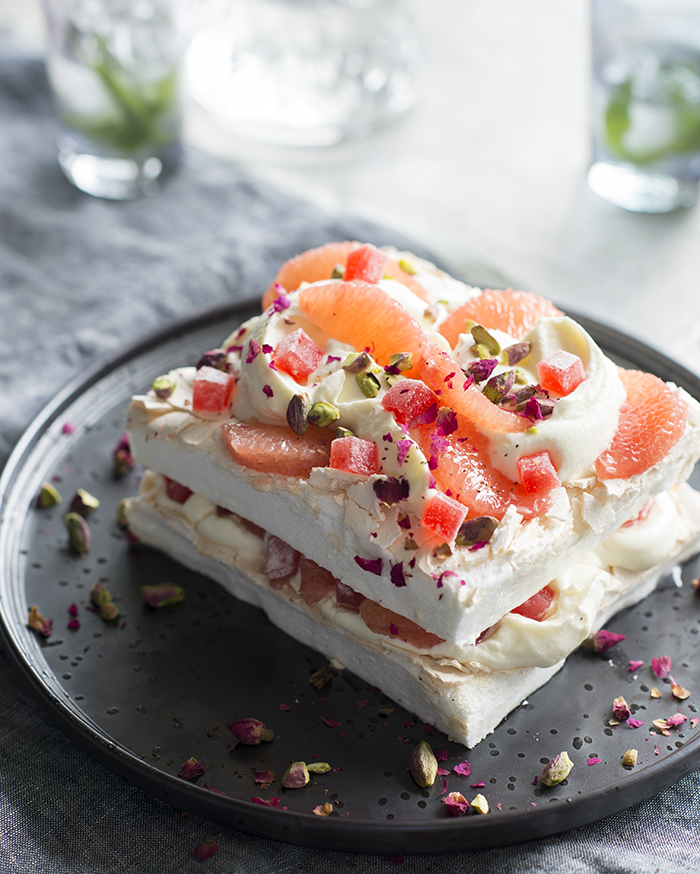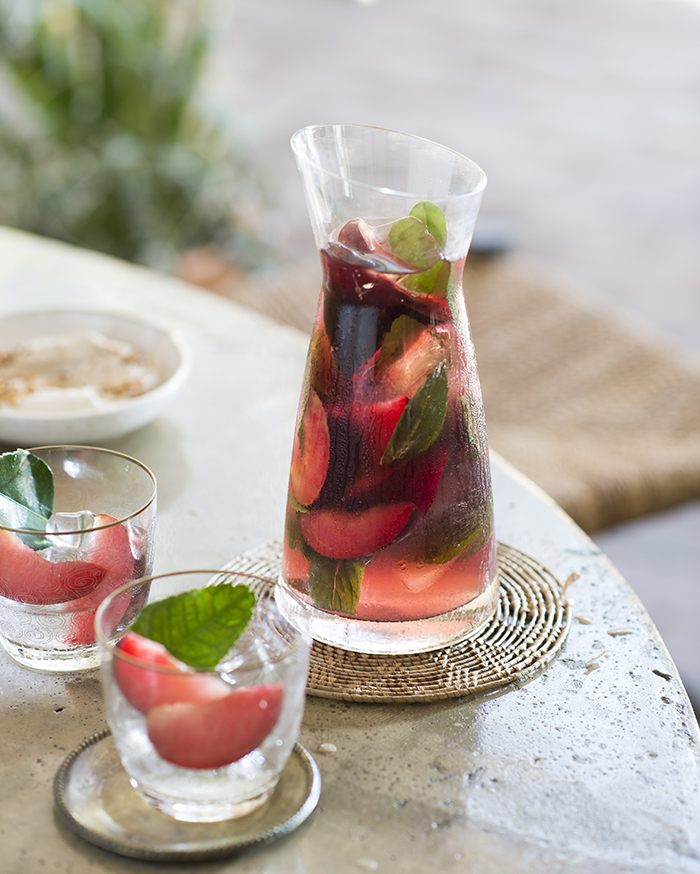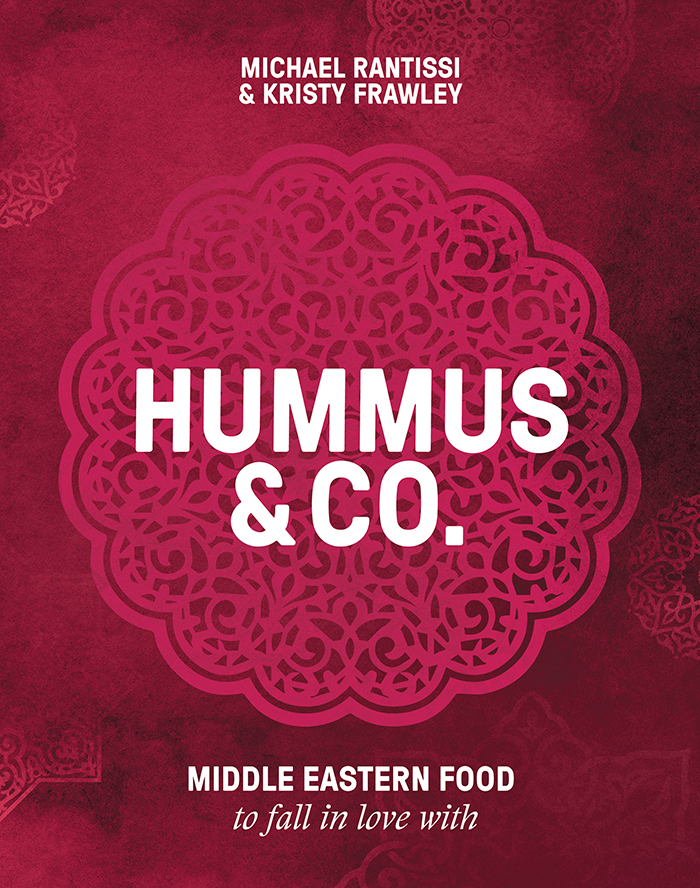Great food for sharing with friends and family and recipes that are made to mix and match, taken from chef Michael Rantissi\’s latest cookbook with partner Kristy Frawley, Hummus & Co.

Fig, haloumi and fresh za’atar leaves
Serves 4 as a starter
The combination of sweet and salty is intriguing and addictive. This salad is the Mediterranean equivalent of salted caramel in a savoury version. It’s very simple, quick and easy to make, but also elegant and impressive and a great starter when entertaining.
125 ml (4 fl oz/½ cup) light olive oil
500 g (1 lb 2 oz) haloumi cheese, cut into 8 slices
235 g (8½ oz/⅔ cup) honey
4 figs, halved lengthways
6 g (⅛ oz/½ cup) za’atar leaves or oregano leaves
100 g (3½ oz) walnuts, lightly toasted
Heat the oil in a large frying pan over medium heat. Add the haloumi and cook for 2 minutes on each side, or until golden brown.
Remove any excess oil from the pan, leaving the haloumi in the pan, and add the honey. Increase the heat to high and allow the honey to reduce slightly. It will become sticky and glossy. Add the figs and cook until warmed through.
Arrange the haloumi and figs on a platter, scatter with the za’atar or oregano and the walnuts and spoon over the warm honey.

Asparagus, pea and feta tart
Serves 6
“I think a weekend brunch is sometimes the best meal of the week because you have a little more time to prepare and a little more time to enjoy the meal,” Chef Rantissi says. “This tart is easy to assemble and most of the components can be made ahead of time. It looks pretty and tastes delicious and fresh. If you don’t want to use peas you can use another vegetable.”
350 g (12 oz/2½ cups) frozen peas, thawed overnight
grated zest and juice of 1 lemon
4 tablespoons olive oil, plus extra for drizzling
1 sheet store-bought all-butter puff pastry, about 20 x 30 cm (8 x 12 inches)
12–14 asparagus spears, peeled and trimmed
150 g (5½ oz) feta cheese
3 soft-boiled eggs
micro herbs, to garnish (optional)
Preheat the oven to 190°C (375°F). Line a large baking tray with baking paper.
Put the peas in a bowl and crush them. Stir in the lemon zest, lemon juice and 3 tablespoons of the olive oil. Season with salt and freshly ground black pepper and set aside.
Put the pastry on the prepared tray and bake for about 20 minutes,
or until golden brown, puffed up and very firm. Remove from the oven and set aside to cool to room temperature.
Heat a chargrill pan or a barbecue grill plate to high. Drizzle the asparagus with 1 tablespoon of the olive oil and sprinkle with salt and freshly ground black pepper. Cook for 1–2 minutes, until grill marks appear.
To assemble the tart, put the pastry on a serving board or chopping board (this will make the tart easier to cut) and top with the crushed pea mixture. Crumble the feta evenly over the tart. Tear the eggs in half and arrange them on the tart. Top with the grilled asparagus and sprinkle with sea salt and cracked black pepper. Drizzle with olive oil and scatter over micro herbs, if using.
Note: The pastry has a long cooking time. Once cut, it needs to be able to hold its shape and soak up the juices.

Layered Turkish delight pavlova
Serves 8
“I always struggle to find light desserts to serve at the end of a meal as most people tend to like chocolate-based desserts,” Chef Fantissi says. “The pink grapefruit in this pavlova has a lovely bitter flavour that cuts through the sweetness of the meringue and balances a rich meal. If you don’t like the bitterness of the grapefruit it can be substituted with orange or any other citrus, but I suggest giving it a try as I think you’ll be pleasantly surprised.”
7 egg whites, at room temperature
375 g (13 oz) caster (superfine) sugar
2 tablespoons white vinegar
1 tablespoon rosewater
250 g (9 oz) mascarpone cheese
250 ml (9 fl oz/1 cup) thin (pouring) cream
50 g (1¾ oz) icing (confectioners’) sugar
4–5 pink grapefruit, segmented (see page 245)
300 g (10½ oz) good-quality Turkish delight, finely chopped
3 tablespoons pistachio nuts, lightly toasted and crushed
Edible dried rose petals, to garnish
Preheat the oven to 160°C (320°F). Spray a 20 x 30 cm (8 x 12 inch) cake tin with non-stick oil and line with baking paper.
Using an electric mixer fitted with a whisk attachment, whisk the egg whites for 2–3 minutes, until soft peaks form. With the machine running, slowly add the caster sugar and then whisk for a further 8–10 minutes, until firm and glossy. Use a metal spoon to fold in the vinegar and rosewater.
Spoon the meringue mixture into the prepared tin and smooth the top. Bake for exactly 20 minutes, then remove from the oven and set aside to cool completely. Don’t worry if the meringue looks a bit rustic when you take it out of the oven.
Put the mascarpone, cream and icing sugar in a large bowl and whisk until soft peaks form.
To assemble, cut the meringue in half so there are two 20 x 15 cm (8 x 6 inch) pieces. Put one piece on a serving plate and top with half the mascarpone mixture, half the grapefruit segments, and half the Turkish delight. Top with the remaining meringue, then the remaining mascarpone mixture, grapefruit and Turkish delight. Scatter the pistachios and rose petals over the top.

Iron goddess iced tea with plums, mint and lemon leaves
Makes about 1.25 litres (44 fl oz/5 cups)
Iron Goddess is a Chinese tea known for its signature floral scent and it’s one of those teas that doesn’t like the temperature of boiling water—hot water does the job. If you can’t find lemon leaves, lime leaves will work just as well.
4 plums, plus extra plum slices, to garnish (optional)
1 mint sprig, plus extra to garnish
5 lemon leaves
1½ tablespoons iron goddess or oolong tea leaves
1 litre (35 fl oz/4 cups) hot water (see Note)
sugar syrup (page 245), to taste
Put the plums in a large container. Crush with a muddler or the end of a rolling pin until the skins have broken (leave the stones in). Add the mint and lemon leaves and set aside.
Put the tea leaves in a large teapot or saucepan, pour in the hot water and steep for 3 minutes.
Pour the tea over the plum mixture through a fine strainer and discard the tea leaves. Leave the plum mixture at room temperature for at least 1 hour, or overnight if possible.
Pour the tea through the strainer into a large pitcher, discarding the plums, stones and leaves. Add the sugar syrup, to taste. Cover and chill the tea until ready to serve. Garnish with the fresh mint leaves and plum slices, if using.
Note: The water should be hot but not boiling, approximately 80°C (175°F).
Sugar syrup
Makes 750 ml (26 fl oz/3 cups)
Sugar syrup can be used in cocktails, mocktails and other drinks such as coffee and iced tea. At the restaurants, we use raw (demerara) sugar to make sugar syrup because of the lovely flavour of sugarcane molasses, but you can use basically any type of sugar you have.
500 g (1 lb 2 oz) raw (demerara) sugar
500 ml (17 fl oz/2 cups) boiling water
Put the sugar in a large heatproof bowl with a lip. Pour in the freshly boiled water and stir until the sugar has dissolved. Allow to cool, then pour into a bottle. Store the syrup in the fridge for up to 1 month.
These delicious recipes are from Hummus & Co. by Michael Rantissi and Kristy Frawley (Murdoch Books, $49.99).

Follow Queensland Homes on Twitter, Facebook, Google+ and Pinterest. If you haven’t grabbed a copy yet you can get the digital edition now or the print copy in newsagents.



